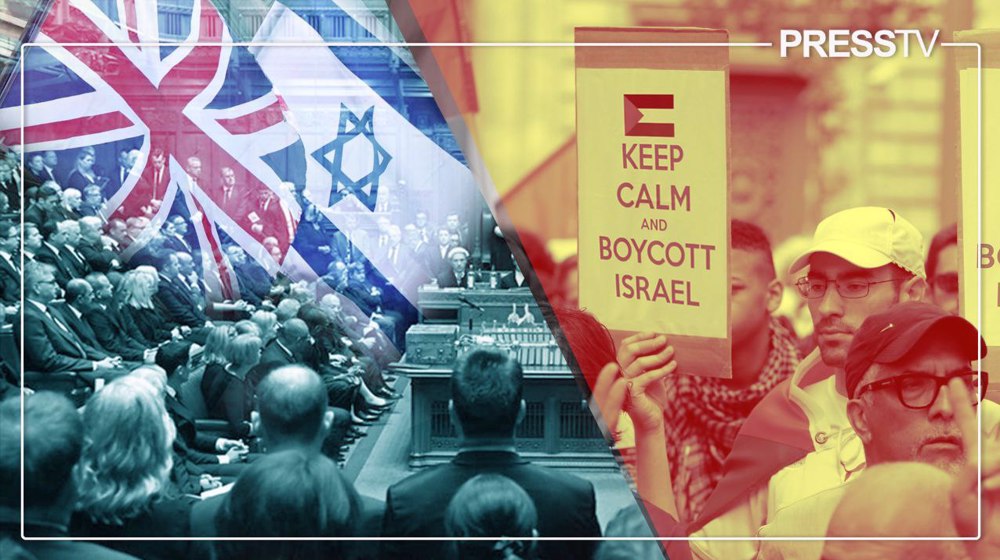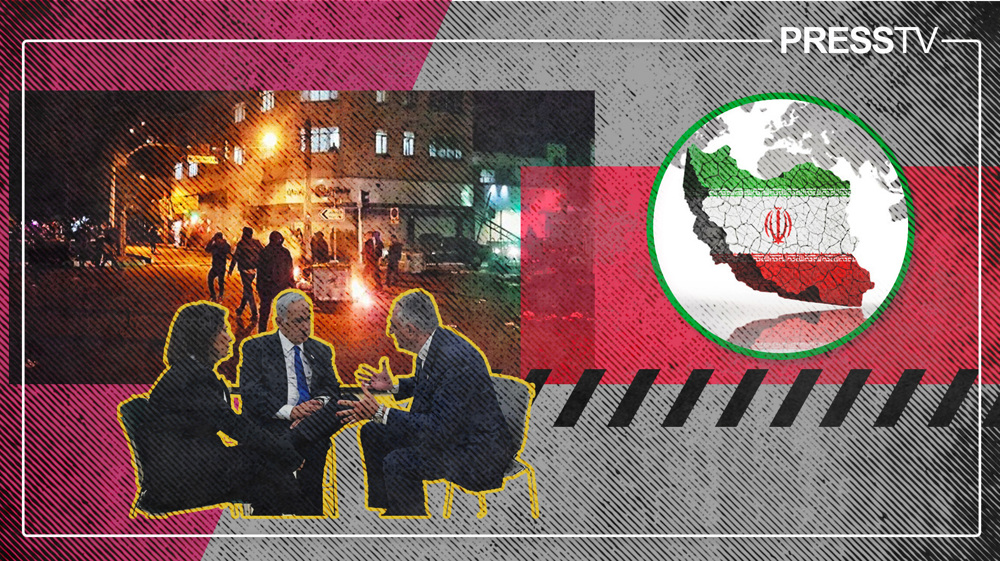Explainer: What is UK’s anti-BDS bill and why it bans anti-Israel boycott?
By Reza Javadi
The UK government is set to table a parliamentary bill next week that seeks to ban public bodies from boycotting Israeli goods, sparking outcry from Palestinian advocacy groups and rights activists.
Under the guise of “antisemitic rhetoric and abuse,” the legislation will prevent public organizations in the UK from boycotting the apartheid regime through sanctions and divestment campaigns.
“These campaigns not only undermine the UK’s foreign policy but lead to appalling antisemitic rhetoric and abuse. That is why we have taken this decisive action to stop these disruptive policies once and for all,” UK Communities Secretary Michael Gove said in a statement on Tuesday, justifying the British government’s decision.
The legislation would enable government officials to carry out probes into suspected breaches of the ban, with British public bodies facing “significant” fines in case of breaking the new rules, The Telegraph reported.
What is the bill about?
The Economic Activity of Public Bodies (Overseas Matters) Bill, which opposes boycotts of the Israeli regime, was first introduced by the British government in May 2022, in line with the 2019 Conservative general election manifesto.
On Monday, Gove announced that UK public bodies will be banned from imposing their own boycott or divestment campaigns against foreign countries and territories under the bill.
“Today’s Bill will stop businesses and organizations – including those affiliated with Israel - being targeted through ongoing boycotts by public bodies – leading to community tensions and, in the case of Israel, a rise in antisemitism,” read the statement.
If passed, the bill would prohibit procurement and investment decisions made by British public bodies that are “influenced by political or moral disapproval of foreign state conduct”.
The potentially prohibited procurement and investment decisions refer to the purchase of goods or the procurement of services by public bodies.
The bill says the government can “specify a country or territory” for which the bill “does not apply” and goes on to state that such exemptions “may not specify” decisions or considerations “relating specifically or mainly to Israel, the Occupied Palestinian Territories, or the Occupied Golan Heights”.
In February last year, the British parliament voted in favor of an amendment that banned public sector workers from boycotting Israeli investments.
What is Boycott, Divestment, Sanctions?
Boycott, Divestment, Sanctions (BDS) is a campaign spearheaded by pro-Palestine advocacy organizations seeking to advance the cause of Palestine by applying economic pressure on Israel.
The international campaign holds that Palestinians are entitled to the same rights as the rest of humanity and urges action to pressure the apartheid Israeli regime to comply with international law and leave the occupied territories, inspired by the South African anti-apartheid movement.
The movement was launched in 2005 by a coalition of 170 civil society groups and is now a vibrant global movement against the Israeli apartheid made up of unions, academic associations, churches and grassroots movements.
It calls for a boycott of “Israeli sporting, cultural and academic institutions” and “Israeli and international companies engaged in violations of Palestinian human rights,” which includes global companies such as Puma, Caterpillar and HP.
“Israel is occupying and colonizing Palestinian land, discriminating against Palestinian citizens of Israel and denying Palestinian refugees the right to return to their homes,” reads the BDS website.
“Inspired by the South African anti-apartheid movement, the BDS call urges action to pressure Israel to comply with international law.”
BDS activists and supporters outrightly reject the notion that the movement is antisemitic, saying the target is the occupying, apartheid regime in Tel Aviv.
What are the objectives of the bill?
As set out in the briefing notes of the 2022 speech by Queen Elizabeth, the legislation would not be restricted to public bodies boycotting Israel but also apply to foreign countries and territories.
It aims at cracking down on the peaceful boycotts of the Israeli regime as these boycotts reveal the criminal character of the illegitimate Israeli regime and its utter disregard for Palestinian lives.
By presenting the long-anticipated bill the British authorities attempt to curtail the freedom of public countries from adopting “their own foreign policy”.
“Today’s Bill will stop businesses and organizations – including those affiliated with Israel – being targeted through ongoing boycotts by public bodies – leading to community tensions and, in the case of Israel, a rise in antisemitism,” read the statement by Gove's office on Monday.
Gove was quoted as saying by Telegraph that the boycott of goods from Israel leads to “appalling antisemitic rhetoric and abuse”.
“These campaigns not only undermine the UK’s foreign policy but lead to appalling antisemitic rhetoric and abuse. That is why we have taken this decisive action to stop these disruptive policies once and for all,” he said, referring to the BDS.
Reactions to the controversial bill
Several British civil society groups have called on the UK government to drop the controversial bill.
In a joint statement on Monday, trade unions and pro-Palestine groups termed the bill an affront to freedom of speech and the rights of workers who want to support the Palestinian cause.
"We are concerned that this [bill] would prevent public bodies from deciding not to invest in or procure from companies complicit in the violation of the rights of the Palestinian people," the statement said.
"We affirm that it is the right of public bodies to do so, and in fact a responsibility to break ties with companies contributing to abuses of rights and violations of international law in occupied Palestine and anywhere else where such acts occur."
Palestine Solidarity Campaign (PSC), a major pro-Palestine advocacy group, in a statement last month warned of the “chilling” consequences of the bill.
“If passed, this law will have a chilling effect on all campaigns for social and political change, by trying to remove a key tool for peaceful activism, while protecting the profit-making interests of corporations at any social and environmental cost,” said PSC director Ben Jamal
“The restriction of the right to use boycott and divestment tactics is an erosion of core democratic rights – and the breadth of the groups opposing this bill reflects that.”
Husam Zomlot, Palestine’s UK envoy, said the bill “encourages more violations of international law” and reminded the UK of its “historic responsibility” towards the Palestinian people.
“By providing a cloak of impunity, this bill encourages more violations of international law, including the acquisition of territory by force, the moving of civilian settler populations to occupied territory – a war crime – or land confiscations and home demolitions,” he said, as cited by The National.
Even the Union of Jewish Students, which is critical of the BDS movement itself, blasted the proposed bill back in February, depicting the legislation as “a risk to British Jewish communities and a setback to Israeli-Palestinian peace.”
Ruth Ehrlich, head of policy and campaigns at Liberty, said: “For a government that professes to care about free speech, the proposed anti-boycott bill, once again, shows their flimsy commitment to protecting freedom of expression.”
In an article in May, senior journalist James Brownsell blasted the conservative government’s pro-Israeli plan as the “latest illiberal attack on democratic norms,” which has been “imported directly from the fringe right in the United States.”
“The potential outlawing of peaceful boycotts of human rights abusers is not only an attack on the freedom of expression, but a narrowing of the democratic space; a bid to silence dissent, to say that only the government's narrative is acceptable,” Brownsell wrote.
‘Friends of Al-Aqsa (FOA)’ have launched a campaign against the controversial plan. In an official statement on Monday, a leading pro-Palestine group announced its condemnation of the move.
The group depicted the measure as “an attack on the democratic right of public bodies in the UK to make ethical choices,” adding that “it is part of the current government’s wide-ranging crackdown on the right to expression.”
Former Labour leader Jeremy Corbyn also blasted the plan and announced his opposition to the Conservative party move in a Twitter post on Sunday, confirming that the BDS endeavors “helped end apartheid in South Africa.”
“They will be essential to ending the apartheid regime in Israel, too. I will firmly oppose the government’s anti-BDS bill — a disgraceful attack on our freedom to fight for human rights, justice and peace,” Corbyn wrote.
Reza Javadi is a Ph.D. candidate in British Studies at the University of Tehran.
Iran condemns Argentina’s unfounded accusations against IRGC
VIDEO | Fighting British state
Pezeshkian calls recent riots in Iran part of ‘failed’ US-Israeli war
VIDEO | Iran unity nullifies sedition
UK ‘preemptively’ discharges pro-Palestine hunger strikers recovering in hospital
US dollar falls in Iran amid rising export currency supply
Trump’s ‘Board of Peace’ for Gaza an extension of Israeli occupation: Ex-UN rights chief
IMF expects Iran’s economy to grow by 1.1% in 2026










 This makes it easy to access the Press TV website
This makes it easy to access the Press TV website